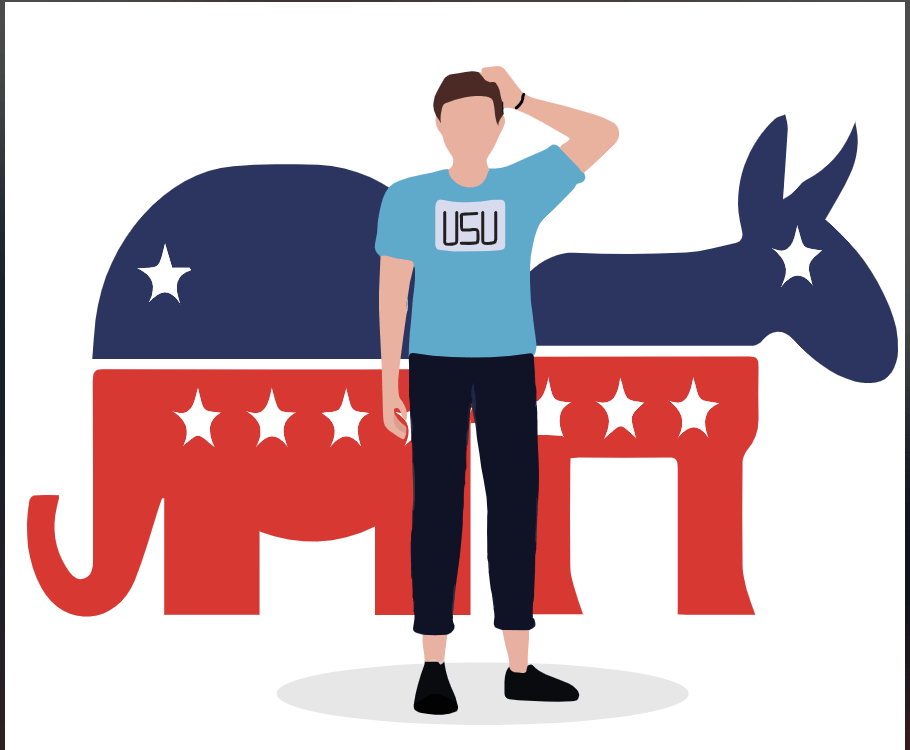Post-election stress: Strategies for managing anxiety, maintaining family connections
After the events of Election Day, the USU semester continued as usual. Many students may be experiencing mental distress from the election process or results, as it impacts the country as a whole and the lives of many students. Managing post-election stress and anxiety has become a priority as students prepare to navigate conversations with loved ones and seek effective ways to cope as they go home for the holidays.
Eri Bentley is a licensed psychologist and the executive director of CAPS. Her main areas of clinical expertise focus on group therapy, trauma, identity development and multicultural issues.
“I think election stress is also unique — everybody’s being impacted by this election and political changes one way or the other, right? So it is a collective stressor for the community, and I think that makes things a little bit unique,” Bentley said.
Bentley advised students to engage in self-care: meeting basic needs like getting enough sleep, food and physical activity. She emphasized the importance of engaging activities that are emotionally rejuvenating or comforting.
“I think talking and connecting with people is also critical, particularly because the current struggle related to this can be divisive and people can feel isolated,” Bentley said.
Something that can be difficult to navigate is the effects of social media on student’s mental health. Bentley remarks how it can create more stress and be used to avoid making real connections with people. On the other hand, students also use social media to talk, schedule and meet with friends.
“And then, I think keeping an eye on how you’re doing and how people around you are doing. Not all stress, like feeling sad or feeling done, require professional support, but it might reach the point that seeking professional help makes sense. So looking out for yourself and for each other to see if things are getting worse.” Bentley said.
If students are continuously having trouble getting out of bed, missing classes or losing sleep, Bentley suggests utilizing the services and support that CAPS provides. These services include information regarding support during a crisis which can involve same-day appointments with a licensed professional, short-term therapy and support connecting with long-term service providers in the community.
Bentley also discussed the many support groups within the CAPS community that can benefit student’s lives and connect them with other people.
“It’s a great way to provide the service to a lot of students. Isolation, disconnection and loneliness are things that many students experience, even if it’s not every day. Students talk about experiencing loneliness here and there, and it has an impact on our well-being. Support groups and group therapy is a great way to address that challenge,” Bentley said.
While Bentley provided important advice and information on dealing with post-election effects on student’s mental health, a history professor discussed peace-building strategies to utilize this holiday season.
Patrick Mason is a professor of religious studies and history and an advisor for the Heravi Peace Institute. In addition to being a history professor, he has a master’s degree in international peace studies and is a proponent of peace-building at USU.
Mason emphasized the importance of taking a peaceful approach, especially if you know there is going to be a disagreement. He talked about how unhelpful it is to enter a conversation with a relative aggressively.
“I think a second principle is to see other people as people. In other words, rather than reducing them to, essentially, an object or a position because of the way they voted or they believe something about a particular issue, actually, to recognize that they are complex human beings,” Mason said.
Mason talked about how the first thing to realize is that they are your family and not just what their vote was or what they believe in. He also discusses the significance of drawing boundaries with family members, especially if one is trying to converse aggressively and attack you rather than discussing out of curiosity.
Mason included some examples of how to turn the conversation around and enforce these boundaries.
“‘Can we maybe just take a breath?’ ‘Can we pause?’ ‘Can we talk about something else?’ ‘Can we talk about football?’ ‘Can we talk about the turkey?’ ‘Can we talk about shared memories that we have as a family?’” Mason said.
The examples focus on de-escalating the situation and connecting as human beings.
“‘Let’s maybe focus on those things and sort of focus on that, and then maybe we can come back to the issue later,’” Mason said. “‘But right now, I feel like this conversation isn’t going to go anywhere productive.’”
As students head home for Thanksgiving and the holidays at the end of the semester, Mason discusses the importance of having difficult conversations with family members in order to reconnect and mend relationships that have been affected by the election.
“This isn’t about conflict avoidance. It’s just about finding ways to constructively engage the conflict,” Mason said. “My last point of advice is, don’t just avoid hard things and hard conversations, but maybe find the right time and the space to do it. And I think that’ll be an opportunity for the relationship to grow.”
You must be logged in to post a comment.


There are no comments
Add yours